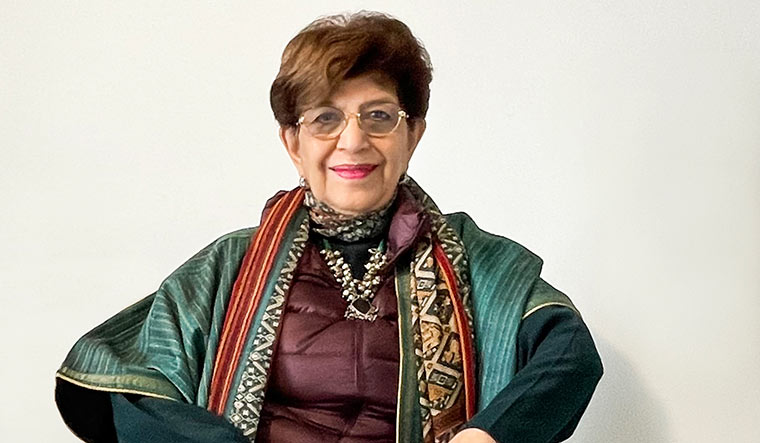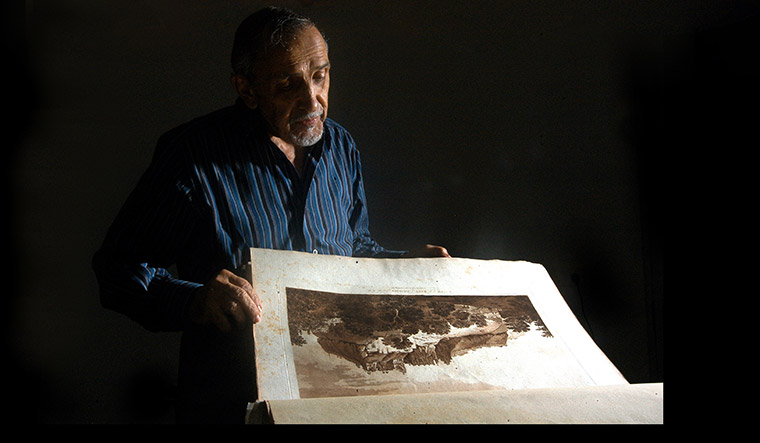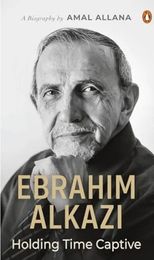There are stories waiting to be told, stories that must be told and stories that tell themselves. Ebrahim Alkazi: Holding Time Captive―a biography of the theatre titan, penned by his daughter and theatre director Amal Allana―is a bit of all three.
The book begins when Alkazi is around 14 and immediately thrusts the reader into a world where a loud condemnation of Mulk Raj Anand’s work about the underdog is countered by an equally passionate argument that cites Bhimrao Ambedkar’s writing on the annihilation of caste. The setting is Poona (now Pune) and interested as he is in these discussions, the young Alkazi is more beholden by the fact that there could be an entire magazine devoted to theatre. At home, the lad, supported by his father, is building a library in a small room of the family home, which bears the handwritten sign ‘Literrati’.
Born to parents of Arabian descent, there was an ‘otherness’ to Alkazi that came from his parents striving to stick to their roots and an India that was rapidly being reconstructed under British rule. In a particularly touching piece, Allana mentions her grandfather, Hamed Al-Qadi, pointing to a box of sand carried from his desert homeland, extolling his children to never forgo its honour just as never to betray the land that had made them its own. This dedication to an Indian identity remains strong in Alkazi as an individual (his boyhood joy at being recognised as a Hindustani, and not a Jew or a Parsi) and as an artiste (who is deeply imprinted by Mahatma Gandhi’s manner of delivery of his message―effective yet unpretentious). These would go on to fuel his desire for making cultural rootedness the objective of theatrical communication, and then the greater aim of neither trying to be an insider or an outsider, but someone who drew from the most liberal ideas of the day.
The title of the book itself comes from a scribble on a piece of paper discovered the day Alkazi died. Talk of serendipity, of stories that shape themselves! Allana remembers a blisteringly hot day in 2016 when she was looking through some old tin trunks lying in a shed on the small farm that the family owned on the outskirts of Delhi. “I was on the last trunk (one of my mother’s), and my husband, Nissar, was urging me to continue this sorting on another day when the weather was more bearable,” said Allana. She asked for just a few more minutes and bingo! “At the bottom of the trunk, to my surprise, I discovered a largish bundle,” she recalled. “Wrapped in an old bedspread were 100-odd drawings and paintings made by my father in the 1940s. I was shaking with disbelief. My God! I had only heard about these works, but never seen them. Studying these works that my father had made when he was barely 23―the very inception of his career―allowed me to gain valuable insight into the direction he was pursuing both thematically and stylistically and as both a theatre director and a visual artiste.”
 Courtesy Amal Allana
Courtesy Amal Allana
Another chance ‘discovery’ for Allana was the 1951 correspondence between Alkazi and Leonard Elmhirst, the British philanthropist. Alkazi, on completing a course at Dartington Hall, had requested Elmhirst for money to make good the shortfall towards his return passage to India. Elmhirst, who barely knew Alkazi, obliged without hesitation. This was one of the many influences that would shape Alkazi’s ethos―the necessity of helping needy young students at crucial moments during their education.
Allana uses the anthropological tool of participant observer―for she writes as an offspring, a student and theatre artiste to paint the picture of a man whose expansive influence on modern culture included laying the foundations of the National School of Drama. She does not falter in the role. There is the well-placed admiration for her father who was one of the main architects in freeing Indian art from ‘colonial mimicry’, as there is gentle ribbing for his hyperboles in the letters he wrote to his wife, Roshen, an integral part of Alkazi’s journey as an artiste and as a human.
“In writing a biography one is committing to be as faithful and as truthful as possible in order for the work to be credible,” said Allana. “My parents… were artistes…. They believed in leading lives that were truthful, and that did not necessarily abide by societal norms and niceties. This was part of the way they asserted their freedom―to live according to their own sense of truth. It was what made them strong and courageous and worth writing about.”
Allana’s prose is simple but effective. There is profuse use of dialogue and a treasured offering of artwork, posters, catalogues, drawings and photographs. At places, it ventures into the poetic and extremely sensitive. The death and sexuality of Sultan Padamsee (Roshen’s eldest brother) is one such example. There is also the walking off of Alkazi’s brother―a festering wound that the family avoids mentioning.
Holding Time Captive is not a book to be read in a hurry. It is to be savoured, gently. There is such a flurry of names and ideas that weave in and out of Alkazi’s life that each introduction would encourage the theatre-inclined to probe further.
Allana’s target readership though is not limited. Much like her father, she believes that art is not an elitist preoccupation or an intellectual pursuit, but should be available and comprehensible to all. “My hope is that his thoughts and ideas will reach a large cross section of people, as they could provide us with valuable insights towards inculcating a more inclusive approach, one that can accommodate differences and help us move away from a narrow, blinkered approach in our search for coexistence,” she said.
The book is as much personal as it is an important historical perspective on the sociopolitical landscape of the India that Alkazi lived through. This juxtaposition offers valuable insights into the dynamics that shaped Indian society and culture. That is equally important as Alkazi’s own churnings about his craft―the introduction of movement over mere vocal gymnastics, the contemplations of stage design, the debate between style and form.
To theatre enthusiasts, it could well bring to mind his son Feisal Alkazi’s book, Enter Stage Right. But on its own, this is a worthy read that captures adequately the movement of time―both in the moment and as an act of leaving a legacy behind.
In that, it is a story that must be told, and must be understood.
Ebrahim Alkazi: Holding Time Captive
By Amal Allana
Published by Vintage Books
Price Rs1,299; pages 672



